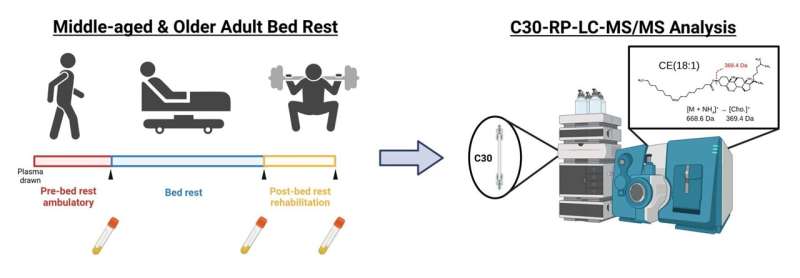This article has been reviewed according to Science X's editorial process and policies. Editors have highlighted the following attributes while ensuring the content's credibility:
fact-checked
trusted source
proofread
Bedrest may affect cholesterol dynamics differently depending on age, study suggests

A new study examining cholesteryl esters suggests that periods of prolonged inactivity may affect people differently depending on their age. Cholesteryl esters—which consist of cholesterol molecules bonded with fatty acids—store and transport cholesterol throughout the body.
As people get older, their risk of being hospitalized or bedridden increases. These long periods of inactivity come with a host of negative health effects such as reduced insulin function and loss of lean muscle, bone mass and strength. Scientists are working to better understand the biology involved in these changes so that therapies can be developed that reduce the negative consequences of physical inactivity.
Trevor Romsdahl, a research scientist at the University of Texas Medical Branch in Galveston, led a recent study.
"We measured the cholesteryl esters from blood plasma collected during bed-rest studies focused on middle-aged and older adults," he said. "To our knowledge no study has measured the specific molecular species of cholesteryl esters during a bedrest study. Most other work has focused on measuring low-density lipoprotein and high-density lipoprotein cholesterol concentrations."
Romsdahl presents the research at Discover BMB, the annual meeting of the American Society for Biochemistry and Molecular Biology, held March 23–26 in San Antonio.
Cholesteryl esters are important in key biological processes such as lipid metabolism, cellular function and overall maintenance of health. Dysregulation of cholesteryl ester metabolism can play a role in the development of cardiovascular diseases and metabolic disorders.
"There's very little information on the biological significance of cholesteryl esters with different fatty acids, which differ in terms of chain length and degrees of unsaturation," Romsdahl said. "Also, much of the research examining cholesterol changes and bed rest has been done in younger adults."
For the new study, Romsdahl's team partnered with Emily J. Arentson–Lantz, an assistant professor at the University of Texas Medical Branch, to analyze plasma samples she acquired in bed-rest studies that were focused on middle-aged and older adults.
To measure specific molecular species of cholesteryl esters, the team developed a sensitive analysis method based on liquid chromatography and tandem mass spectrometry. It involved using a highly hydrophobic C30 liquid chromatography column to separate different cholesteryl ester species based on what fatty acid they contained.
The analysis showed that during bed rest several cholesteryl esters tended to increase in middle-aged subjects but decrease in older adults. However, the researchers observed similar changes in middle-aged and older adults when post-recovery levels were compared with pre–bed-rest levels.
"More research is needed to better understand the biological significance of these results and what effect they may have on health," Romsdahl said. "However, it is possible that altering or supplementing meals with certain fatty acids versus others could subtly shift the cholesteryl ester species to a healthier profile."
More information: Abstract: A C30 RP-LC-MS/MS Method for Analyzing Cholesteryl Esters from Human Plasma




















